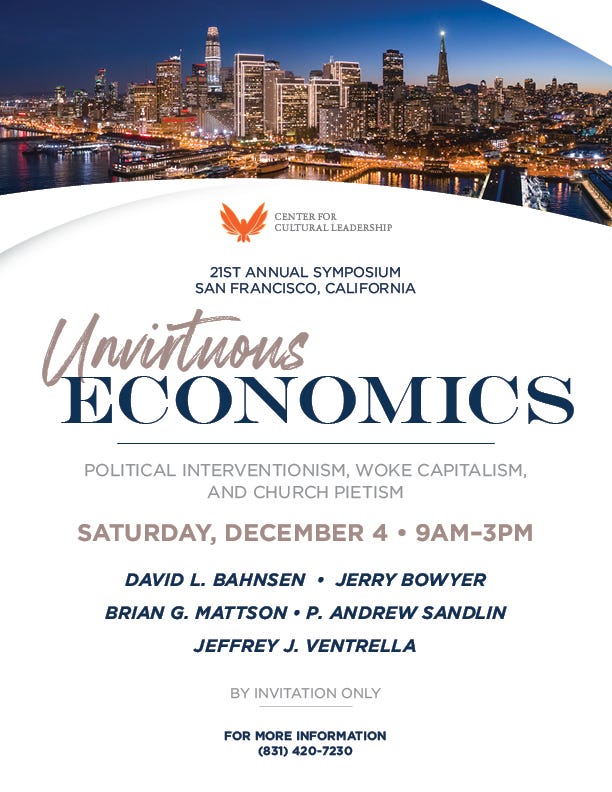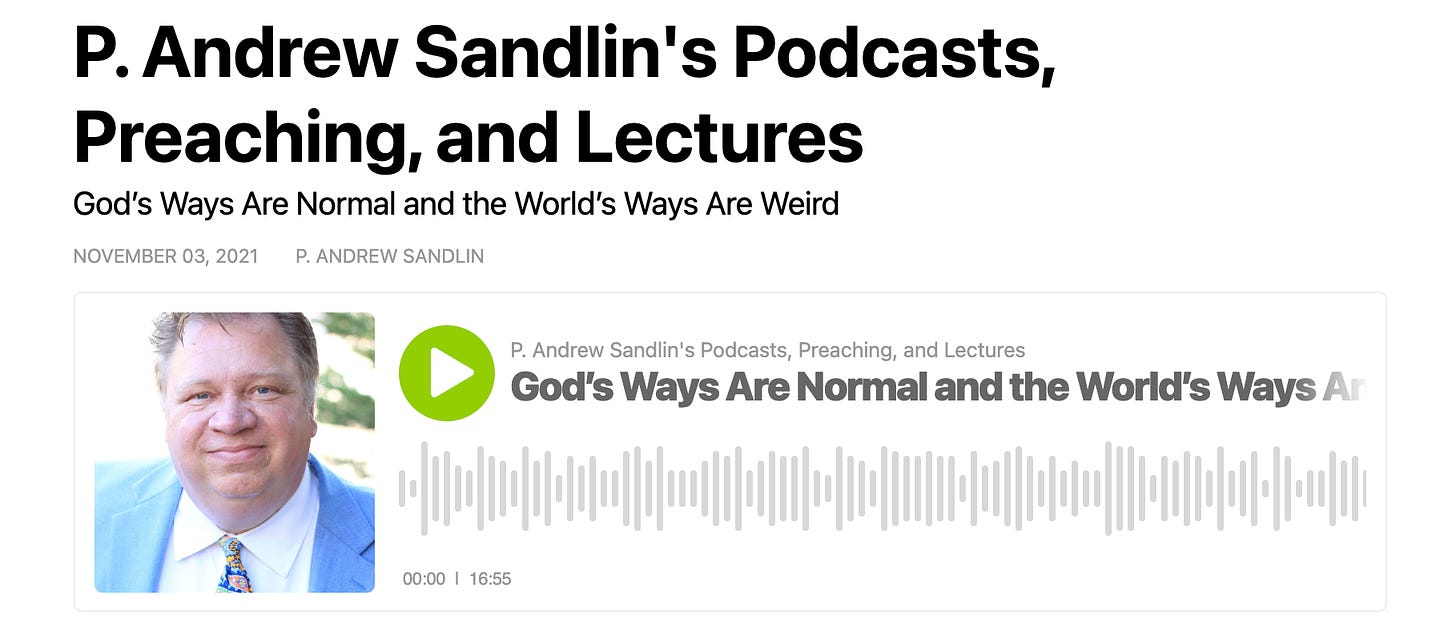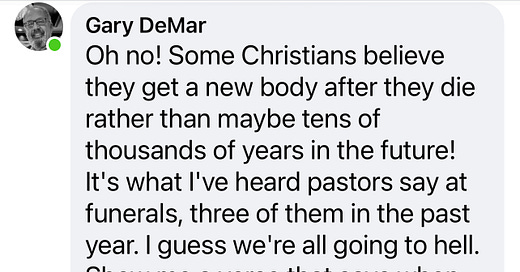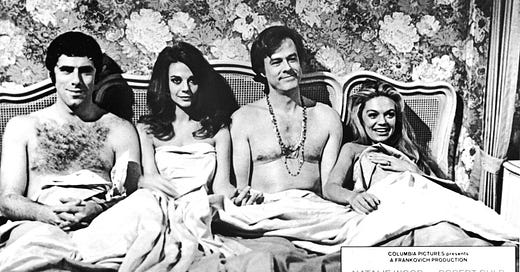
One Crusader’s Calling
If we don’t have Christian crusaders in the culture, Christian crusaders in family and church won’t matter much.
Dear friends and supporters:
I didn’t write an e-newsletter last week due to extensive ministry in Texas (note the link to a talk below) and a harrowing plane trip home, including delayed luggage (I’ve almost abandoned flying). I generally include a personal segment of the conclusion of every CultureChange, but most of today’s iteration will be personal.
Although some Christians rely too heavily on aphorisms to shape their thinking (“God will never load us with burdens too heavy to bear,” etc.), it’s important to remember that aphorisms can often succinctly affix a truth to our mind and heart. Recall the book of Proverbs consists almost entirely of aphorisms. Short, pungent, truthful points can mold our lives.
One aphorism I’ve never forgotten and which consistently shapes my thinking and life I first heard from the pastor of the Christian school I attended in the mid- late 70s. He was a strong, crusading man of God, now deceased. He once wrote this: You cannot preserve a position without crusading for it. He was combating the widespread idea that some biblical doctrines and practices are so obvious that they can be taken for granted. He countered that this approach might sustain taken-for-granted truth in a single generation, but that truth will not survive into succeeding generations. Our spiritual heirs will eject what we do not emphasize.
The Bible teaches this truth. In his epistle Jude writes (v. 3):
Beloved, when I gave all diligence to write unto you of the common salvation, it was needful for me to write unto you, and exhort you that ye should earnestly contend for the faith which was once delivered unto the saints.
The word “contend” includes the idea of “being a combatant” — crusading, we could even say. We sometimes hear the pious observation, “The Faith and the Bible need no defense,” but saints throughout both the OT and NT — and our Lord, too — didn’t seem to feel that way. They combatted evil both inside and outside the church. Apparently, the truth requires not just affirmation and acceptance but also crusades in order to be preserved.
If we wish to preserve a position, we must crusade for it. That word crusade has fallen on hard times, not only among secularists (who deplore any crusading except their own) but even in the church (for which the medieval crusades were unthinkably anti-Christian). I deal more fully with this problem in my essay “Crusading Christianity.”
My public ministry from its inception has consisted largely, though of course not exclusively, of crusading; and the longer I live, the more grateful I am to God for this calling. I am fully aware that God in Christ creates peace, the great shalom: peace with God through the death of his Son, peace in our hearts due to the presence of the Spirit, and peace with one another.
But we cannot be at peace with a fallen world, nor with false teaching in the church, nor especially with our own fallen nature. Jesus himself warned his disciples (Mt. 10:34):
“Do not think that I came to bring peace on earth. I did not come to bring peace but a sword….”
His point was that devotion to him divides even the closest human relationships.
I not unaware of the perennial temptation among many Christians to lust for crusading — just plain contentiousness, actually, and not only among the “fightin’ fundies.” John M. Frame has famously written about “Machen’s Warrior Children,” cataloging numerous internecine controversies rending the Reformed and Presbyterians alone over the last few decades, and the Baptists and charismatics and others can be equally quarrelsome.
But in a fallen world, any public minister and ministry must crusade (and not only ministers and ministries, but all Christians), for the right issues, and with the right motives.
As I look back on my own life, I find three broad spheres in which I have felt impelled to crusade, and they correspond to the development of my ministry, and though arriving sequentially, each of them still impels me.
Soteric Crusading
The first surrounds the gospel message and preaching. I came of age theologically in the late 70s and early 80s. One of the great controversies roiling evangelicals was the Lordship Salvation (LS) controversy: when we trust Jesus Christ, do we embrace him both his Savior and Lord, or only a Savior? John MacArthur championed LS, while Zane Hodges was its leading scholarly antagonist. From the first I was squarely on the side of LS, notably due to two influences on my life. First, the greatest influence of all, my father, an uncompromising, Bible-believing Christian preacher, who constantly stressed Jesus Christ as Lord. The second was the writings of A. W. Tozer, an Arminian who had actually written about (and defended) LS a couple of decades before the evangelical controversy rose fully flamed.
But I wasn’t simply convinced of LS. I found it necessary to crusade for it. Why? Because I had seen hundreds, perhaps thousands, of individuals seemingly trust Christ as their Savior, get baptized, receive assurance of salvation, and yet live lives entirely like unbelievers. It seemed (and seems) to me that anti-LS inspires spurious assurance and, therefore, if not a false gospel, is at least a severely warped one.
Of course, the opponents of LS believed that we advocates were in fact preaching a false gospel, since we were preaching salvation by works. I rigorously dispute that accusation, but it is true that these are antithetical positions, and if one is true, it is worth crusading for — and its alternative worth crusading against.
I did crusade for LS, and I still crusade for it. I believe that the anti-Lordship view is a salient example of the antinomian spirit of our age.
This leads me to the second sphere of crusading.
Theological Crusading
That is theological crusading. I was reading theology at 13 or 14 years old, but began to investigate it in earnest in my late teens and early 20s. I’d been reared by unwavering theological conservatives, so I was aware of the deep poison modernism and liberalism had introduced into the 20th century Christian bloodstream. It was not until I began voluminous theological and philosophical investigation, however, that I discovered the specific poisonous strains killing Christianity and almost all denominations.
I soon learned that the poisonous fountain (at least as it relates to ideas, which always have momentous consequences) was the leading Enlightenment philosopher Immanuel Kant, whose innovative epistemology (theory of knowledge) rendered God unknowable, and later Georg Wilhelm Friedrich Hegel, who had almost the opposite problem: enmeshing God so much into history that he was indistinguishable from man’s thoughts and actions. It was not the first or last time that non-Christian philosophy would warp Christian theology. This toxic cocktail was encapsulated in the thought of the first Romantic liberal, Friedrich Daniel Ernst Schleiermacher, and it spread throughout the body of Western Protestantism by the late 19th and early 20th century.
The older, orthodox, biblical idea of the knowability of God and his revelation, as well as the Creator-creature distinction, were truths for which I had to crusade to protect the Faith of those under my care and with whom God had granted me a platform.
And then they were more specific deviations, like the antinomianism that I’ve already mentioned, the abandonment of God‘s law as a standard of behavior for Christians and the church and also for the state.
Equally dangerous were escapist eschatologies like dispensationalism, that radically divided God‘s purposes between heaven and earth, Israel and the church, material and immaterial, gospel and law, and present and future. These mistaken theologies and many others robbed the church of her power and reduced her to irrelevance.
It seemed to me, and it still does, that if we’re unwilling to crusade for the truth on these matters and others, we can expect only further apostasy from biblical Christianity in our time.
Worldview Crusading
Third, over the last couple of decades I have increasingly committed myself to worldview crusading. For years I was under the impression that the sins of the evident cultural apostasy sprang from the theological deviation of the church and Christians. But I gradually came to realize that, while the church was often complicit in the social deviation, the church has a long history of capitulating to an apostate culture. In large part, the greatest battles, therefore, must be cultural battles, because the culture influences the church, not generally the other way around. This started in the ancient church, Israel, constantly imbibing the paganism of the surrounding Canaanite nations, and it continued in sub-apostolic times with certain church fathers forging a syncretism of biblical Faith and Greek philosophy.
Consider, for example, sexual egalitarianism and radical feminism. I’ve heard it said that these pervasive (and poisonous) cultural ideologies actually began in the church, but this assertion is empirically refutable. In fact, quite the opposite is true. Throughout almost its entire history, until well into the 20th century, the church in almost all its sectors has recognized the unique creational callings of men (women too) in family, church and the wider society, even if they have not always practiced that sexual uniqueness (and hierarchy) as they should have. It was secular egalitarianism in the culture that began to infect the church. Today’s egalitarian battles in the church are a direct result of the victory of egalitarianism in the culture.
The same tends to hold true across the board (Cultural Marxism, Critical Race Theory, statism, and progressivism). Therefore, to crusade for the victory of biblical theology in the church and the family, we must crusade against the alien worldviews that influence the cultural mindset, which in turn poisons the church. This is why I started the Center for Cultural Leadership over 20 years ago, and I am increasingly committed to this version of crusading today. Few have stated the matter as accurately as did H. Evan Runner in 1968:
Even to preserve the organized churches and whatever theology may be dear to us we shall have to fight for a more integral Christian society. Today, in our western world, there will either be a quickening of Christian faith to sense the religious unity of man’s life in the world, or there will follow the last remaining steps, almost imperceptible in their advance, to a thoroughly secular way of life in which there is no place for the Good Shepherd’s voice. It is not possible in the twentieth century [and twenty-first century, PAS] for Christians to make a good confession only within the secure shadows of the institutional church.
If we don’t have Christian crusaders in the culture, Christian crusaders elsewhere won’t matter much.
Conclusion
It is for these reasons — aside from the most important reason, that God demands it — that I feel justified in crusading, one of the central calls of my life, in fact. As Martin Luther, a much more famous and accomplished crusader might say, here I stand. I can do no other.
Yours for holy crusading,
Founder & President, Center for Cultural Leadership
Will you consider a tax-deductible donation to CCL via PayPal or Venmo? Or mail a check to CCL, Box 100, Coulterville, CA 95311. God uses you to keep us going — and expanding.
Is “Cultural Marxism” Anti-Semitic
Last week I was contacted by a friend serving as faculty at a major Christian university. He’d assigned one of my essays on Cultural Marxism to his class, and one student had reported him for promoting anti-Semitism and initiated serious legal charges against him. He asked me to provide a statement to assist in his defense. Here it is, in slightly expanded form:
I have widely and extensively used the term Cultural Marxism to describe the particular ideological bent rooted initially in the writings of the revisionist Sardinian Marxist Antonio Gramsci and Hungarian Marxist György Lukács. It was almost simultaneously developed by Germans associated with the so-called Frankfurt School of Critical Theory. While the nomenclature was devised or popularized first by German anti-Semites to smear this broad ideological movement (since many of its members were Jewish), I have never used it in that way and am an un-flagging opponent of anti-Semitism. Political scientists and historians sometimes refer to the school as neo-Marxist, revisionist Marxist, Western Marxist, or existential Marxist. There are, of course, variations of meaning, but all generally denote the same school of thought which, indeed, itself reflects variations.
Nothing in Cultural Marxism is unique to the Jewish faith or race. Indeed, the Jews among its number were all atheists, having turned their back on the faith of their ancestry. The fact that many were Jews is entirely incidental.
The principal reason I choose the term Cultural Marxist is because I serve an educational foundation known as the Center for Cultural Leadership, which stresses the cultural aspects of Christianity and its opponents, and I have wished to highlight that version of Marxism that centers egalitarian societal transformation on culture rather than the more conventional Leninism-Marxism (“Classical Marxism”), devoted to the instrument of violent political revolution.
Cultural Marxism precisely draws attention to its leading distinctive feature.
I’ve always abhorred anti-Semitism in my writing and lectures, as any of my readers of the last four decades knows; and my use of the term Cultural Marxism, while coinciding with the use of some anti-Semites, is precisely that: a coincidence.
P. Andrew Sandlin
Center for Cultural Leadership
Exposing a great deception for Christian youth unleashed by the Father of Lies.
Listen here.
More great stuff:
The Center for Cultural Leadership site is here.
My Amazon author page (print and digital) is here.
You can find my sermons and lectures at my YouTube channel.
Sign up to get my blog updates here.
Here’s my Twitter feed.
If you want to get the free exclusive hard copy publication Christian Culture, please send me a Facebook private message.
The CCL phone number is 831-420-7230.
The mailing address is:
Center for Cultural Leadership
P. O. Box 100
Coulterville, CA 95311












Dr. Sandlin,
I've been meaning to find a way to thank you. Thank you for crusading, thank you for the clarity, thank you for the boldness/backbone. I have benefited tremendously from your talks, books, articles, etc. I have shared so many of your podcasts and articles to people, and they have gotten back to me and told me that those podcasts were "paradigm shifts" specifically in relationship to the creational worldview/pietism, etc. When I begin sharing with a new believer, it is essential for me to send them your material. Lastly, the Lord has been convicting me and challenging me to be more prayerful, just in general. I appreciate your emphasis on prayer being the fuel of the kingdom. I hope to meet you one day and thank you in person. May the Lord continue to richly bless you and your family.
If you send me an invitation, we will try to work something out.